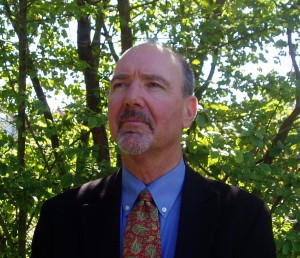Dr. Kent Mullinix quickly captured the attention of his audience at

the Hedley Seniors’ Centre Friday evening when he said “No sustainable food system, no sustainable humanity. Food sustainability is going to be mankind’s supreme challenge.” At a time when crises threaten the outbreak of serious military conflict at various points on the globe, we did not expect to be told the most dangerous issue facing humanity could soon be a shortage of food.
Dr. Mullinix is Director of the Institute for Sustainable Food Systems at the Kwantlin Polytechnic University. His two Phd.’s in agriculture related fields and almost 4 decades of experience in agriculture make his views worth listening to.
There was a discernible passion and intensity in his voice when he spoke of the significant threats to our food system. “Think about the trend,” he urged, “and about the logical conclusion the trend indicates. It’s the trend that is important, not a snapshot of the present.”
He said the agricultural industry is an 11,000 year old endeavour. The soil in the Similkameen valley, he said, took thousands of years to develop. The present industrial agricultural system has been in existence 50 years and, in his view, lacks adaptability and resilience. He pointed out that there is less diversity and it requires “propping up” with pesticides and fertilizers. These are damaging to the earth, thereby causing habitat and biodiversity destruction.
Dr. Mullinix considers the present system to be “hugely costly.” “It requires great amounts of oil and natural gas for energy,” he said. Small farmers are getting out. There is a tremendous consolidation in the agriculture sector. (In my conversation with him after the session he referred to large agricultural corporations as “robber barons.”)
“Money, machines, and fossil fuels have replaced strong backs, big hearts and youthful exuberance,” he told his audience.
The result, in his opinion, is that there is less nutrition in our food. “We have to pay more and eat more to get the same amount of nutrients. Spinach now contains little iron.”
Other consequences of industrial agriculture, he noted, are pesticide and fertilizer contamination, soil erosion, salinization, desertification, pollution of air, water and soil. Problems also include acquifer and ground water depletion and greenhouse gas emissions. Referring to information published by the National Academy of Sciences, he said “Current practises by large agricultural entities are producing the kind of conditions that create dust bowls. This begins to happen when carbon dioxide levels reach 450 ppm. We are now at 400 ppm.”
Dr. Mullinix compared the experience of conventional (industrial) farms versus organic farms in Nicaragua after Hurricane Mitch. On organic farms there remained 40% more topsoil, and an average of 20% more vegetative cover. There was also an average of 40% less landslide incidence, 47% less soil erosion, and 69% less gully erosion.
“In B.C.” he said, bringing the situation closer to his audience, “there will be less precipitation, a smaller snow pack, increased temperature and higher sea levels. The cost of food will rise.”
In view of his dire predictions, we might expect Kent Mullinix to be immobilized by anxiety. Rather, he is working with others to educate and empower people, such as the group he addressed this weekend. He wants people to become aware of the challenge and develop a plan to respond.
”Our program is a people/community proposition,” he asserted.
He said they are working to establish Farm Schools, also referred to as Incubator Schools, to prepare young people for small scale farming.
“We need to support small scale farming,” he suggested. “It is possible to create jobs, businesses and produce food in the Okanagan. It’s a community builder and driver. Let’s work to keep the jobs and the money here.”
Dr. Mullinix’s keynote address set the tone for this second in a series of Community Conversations organized by Angelique Wood and Kim English. The conversation continued Saturday morning. Participants were divided into three small groups to discuss threats, weaknesses, opportunities and strengths, as they pertain to sustainable food systems. Date of the next “Conversation” will be announced and the organizers invite all interested citizens.
